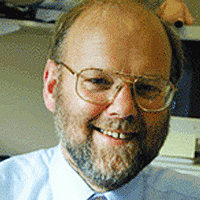Sir IAN WILMUT, is the Chair of Reproductive Biology and the Director Scottish Centre for Regenerative Medicine at the University of Edinburgh.
The former head of the Department of Gene Expression and Development at the Roslin Institute near Edinburgh, Scotland, Wilmut is uniquely qualified both as a pioneer in the science of cloning and as a participant in the public discussions of its possible social and ethical consequences. He is the leader of the team that produced Dolly the sheep in 1996, the first animal to be cloned from an adult cell. Since Dolly's birth, he has become something of an international figure as an expert on cloning techniques, and his laboratory continues to play a leading role in the development of methods for the cloning and genetic modification of animals. He was knighted in 2008.
Dr. Wilmut's own research centers on the cloning of human embryos to provide stem cells for treatment of degenerative disorders such as diabetes and Parkinson's disease. He has been a frequent advocate of the medical benefits to be derived from this new technology, giving many public lectures on the subject and participating in numerous panel discussions on the potential uses and misuses of cloning. He has also testified in the United Kingdom, France, and the United States before parliamentary and congressional committees considering the legislative regulation of cloning.
Dr. Wilmut has a distinguished record of ground-breaking biological research. He obtained a B.Sc. in Agricultural Science at the University of Nottingham before studying at the University of Cambridge, where he was awarded a Ph.D. in 1971. His subsequent research in Cambridge led to the birth of the first calf from a frozen embryo — "Frosty" — in 1973. He moved to Edinburgh that year and has worked there ever since. Besides heading a department at the Roslin Institute, he serves as scientific advisor to Geron Bio-Med, a wholly owned subsidiary of the Geron Corp of Menlo Park, California. The objectives of current research are to develop biomedical applications of the nuclear-transfer procedure: these include the provision of modified animal organs and human stem cells for therapy.
Ian Wilmut's work has been recognized by many awards and honorary degrees. In 2000, he was elected a Fellow of the Royal Society of Edinburgh, the highest Scottish society of learning, and in the previous year was made a member of the Order of the British Empire by Queen Elizabeth II. Other awards include a fellowship in the Academy of Medical Sciences, the Lord Lloyd of Kilgerran Prize, the Sir John Hammond Memorial Prize of the Society for the Study of Fertility, the Sir William Young Award of the Royal Highland & Agricultural Society of Scotland, and the Research Medal of the Royal Agricultural Society of England.
In addition to his many research papers, Dr. Wilmut has written a large number of popular articles on the subject of cloning, including pieces for Time, New Scientist, and Scientific American. In 2000, with coauthors Colin Tudge and Keith Campbell, he published The Second Creation: Dolly and the Age of Biological Control, which describes the research leading to the birth of Dolly and initial impressions of the value of cloning techniques. Publicity for the book was shared among the authors; Dr. Wilmut spoke at book publicity events in London, Cardiff, Dublin, Edinburgh, and Munich, and gave many interviews to newspapers, magazines, radio, and television. He plans to publicize the book in his public lectures and articles as well as participate in tours to promote After Dolly: The Uses and Misuses of Cloning.



